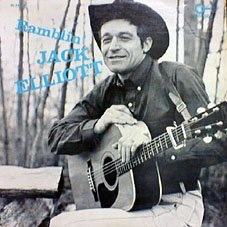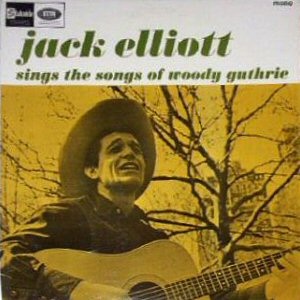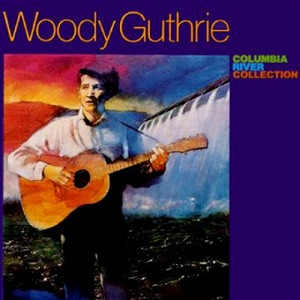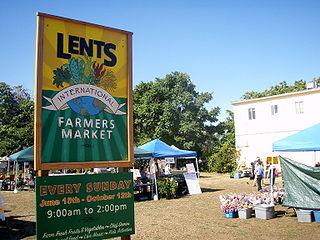
Grand Coulee Dam is a concrete gravity dam on the Columbia River in the U.S. state of Washington, built to produce hydroelectric power and provide irrigation water. Constructed between 1933 and 1942, Grand Coulee originally had only two powerhouses. The third powerhouse, completed in 1974 to increase energy production, makes Grand Coulee the largest power station in the United States by nameplate-capacity at 6,809 MW.

Bonneville Lock and Dam consists of several run-of-the-river dam structures that together complete a span of the Columbia River between the U.S. states of Oregon and Washington at River Mile 146.1. The dam is located 40 miles (64 km) east of Portland, Oregon, in the Columbia River Gorge. The primary functions of Bonneville Lock and Dam are electrical power generation and river navigation. The dam was built and is managed by the United States Army Corps of Engineers. At the time of its construction in the 1930s it was the largest water impoundment project of its type in the nation, able to withstand flooding on an unprecedented scale. Electrical power generated at Bonneville is distributed by the Bonneville Power Administration. Bonneville Lock and Dam is named for Army Capt. Benjamin Bonneville, an early explorer credited with charting much of the Oregon Trail. The Bonneville Dam Historic District was designated a National Historic Landmark District in 1987.

"Roll On, Columbia, Roll On" is an American folk song written in 1941 by American folk singer Woody Guthrie, who popularized the song through his own recording of it. The song glamorized the harnessing of the Columbia River in the Pacific Northwest. The 11 hydroelectric dams built on the American stretch of the Columbia helped farms and industry, but their construction also permanently altered the character of the river.

Ramblin' Jack Elliott is an American folk singer and performer.
"Pastures of Plenty" is a 1941 composition by Woody Guthrie. Describing the travails and dignity of migrant workers in North America, it is evocative of the world described in John Steinbeck's The Grapes of Wrath. The tune is based on the ballad "Pretty Polly", a traditional English-language folk song from the British Isles that was also well known in the Appalachian region of North America.
Pacific Northwest Waterways Association, also known as PNWA, is a collaboration of ports, businesses, public agencies and individuals who combine their economic and political strength in support of navigation, trade and economic development throughout the Pacific Northwest.
"Worried Man Blues" is a folk song in the roots music repertoire. It is catalogued as Roud Folk Song Index No. 4753. Like many folk songs passed by oral tradition, the lyrics vary from version to version, but generally all contain the chorus "It takes a worried man to sing a worried song/It takes a worried man to sing a worried song/I'm worried now, but I won't be worried long." The verses tell the story of a man imprisoned for unknown reasons "I went across the river, and I lay down to sleep/When I woke up, had shackles on my feet", who pines for his lost love, who is "on the train and gone."

The Live Wire: Woody Guthrie in Performance 1949 is a recording of a concert by Woody Guthrie in Newark, New Jersey, one of a small number of surviving live recordings of the folk singer. The program consists of Guthrie answering questions from his wife Marjorie about his life, and singing songs. The recording was made on an inexpensive wire recorder by Paul Braverman, and a significant restoration process was required to clean up the audio on the two spools of wire. In 2008 the album won a Grammy Award for Best Historical Album.

South Coast is an album by American folk musician Ramblin' Jack Elliott, released in 1995. It was his first new studio release in over 20 years.

Ramblin' Jack Elliott is an album by American folk musician Ramblin' Jack Elliott, released in 1961.

Jack Elliott Sings the Songs of Woody Guthrie is an album by American folk musician Ramblin' Jack Elliott, released in 1960. It consists of songs written or well known as performed by Woody Guthrie.

Ramblin' Jack Elliott Sings Songs by Woody Guthrie and Jimmie Rodgers is an album by American folk musician Ramblin' Jack Elliott, released in 1960 in Great Britain and in 1962 in the US on the Monitor label.

The Lost Topic Tapes: Cowes Harbour 1957 is an album by American folk musician Ramblin' Jack Elliott, released in 2004. Elliott recorded a number of albums on the Topic label in London in the 1950s. The songs on this compilation are taken from rediscovered tapes found in the British Library in London. They were recorded on a yacht at Cowes Harbour in 1957. Several songs were issued in Britain on Jack Takes the Floor.
"Grand Coulee Dam" is an American folk song recorded in 1941 by Woody Guthrie. He wrote it during a brief period when he was commissioned by the Bonneville Power Administration to write songs as part of a documentary film project about the dam and related projects.
Woody At 100: The Woody Guthrie Centennial Collectionis a 150-page large-format book with 3 CDs containing 57 tracks, including Woody Guthrie's most important recordings such as the complete version of "This Land Is Your Land," "Pretty Boy Floyd," "I Ain't Got No Home in This World Anymore," and "Riding in My Car." The set also contains 21 previously unreleased performances and six never-before-heard original songs, including Woody's first known—and recently discovered—recordings. It is an in-depth commemorative collection of songs, photos and essays released by Smithsonian Folkways in June 2012.
Released in 2005, Folkways: The Original Vision is an expanded rerelease of the 1989 album Folkways: The Original Vision, created by Smithsonian Folkways to document the origins of the Folkways Records label. The rerelease was created on the 15th anniversary of the original album, and included enhanced liner notes and six bonus tracks.

Bound for Glory is a 1956 album by Woody Guthrie and Will Geer. It consists of a selection of songs from Guthrie's Dust Bowl Ballads of 1940 and his Asch recordings of 1944-45, each introduced briefly by Geer with spoken relevant extracts from Guthrie's writings.
Roll on Columbia: Woody Guthrie and the Columbia River Songs is a 2011 documentary film concerning Woody Guthrie's music created for Columbia River projects, especially "Roll On, Columbia, Roll On". It premiered at McMenamin's Pub in Troutdale, Oregon. In the documentary, oral historian Michael O'Rourke is interviewed about Guthrie's month of songwriting in Oregon and Washington. O'Rourke also produced the film. The film was spawned from a radio documentary that O'Rourke did for Oregon Public Broadcasting.
















